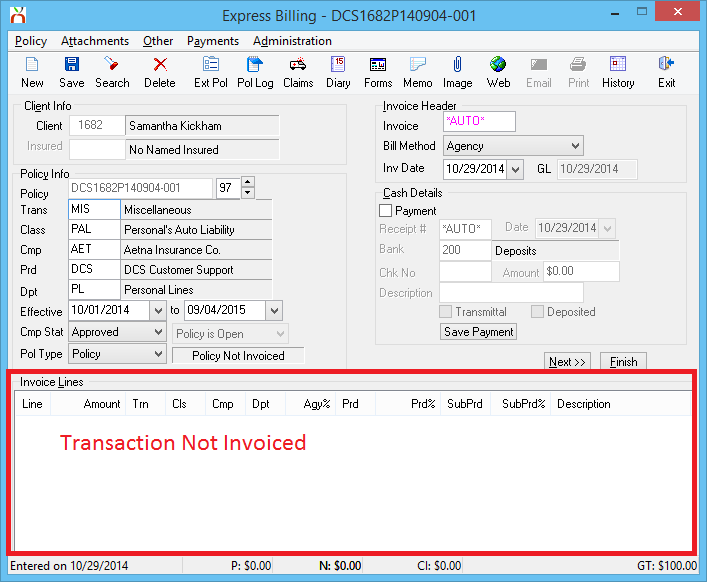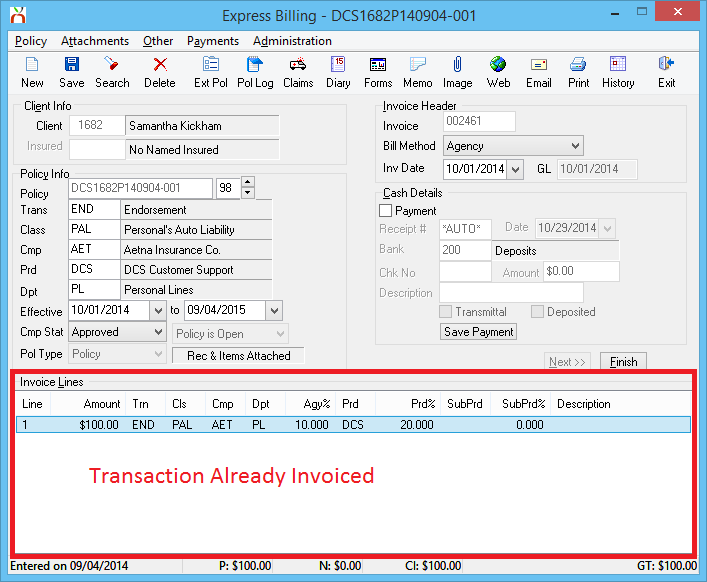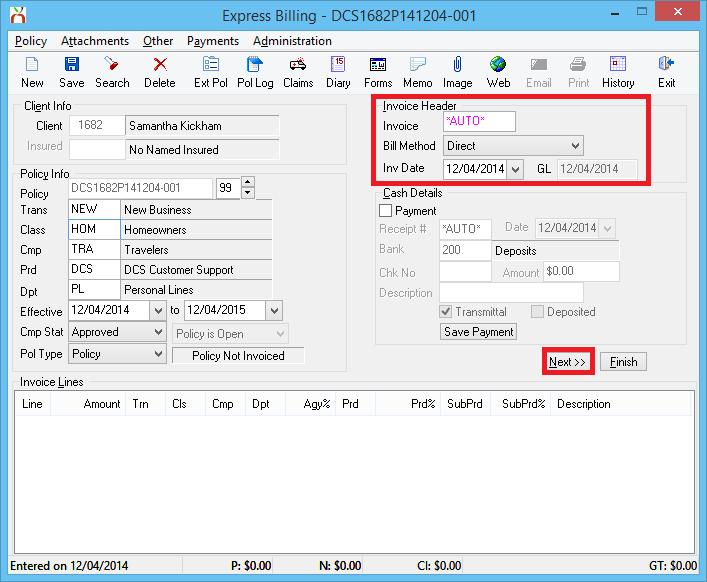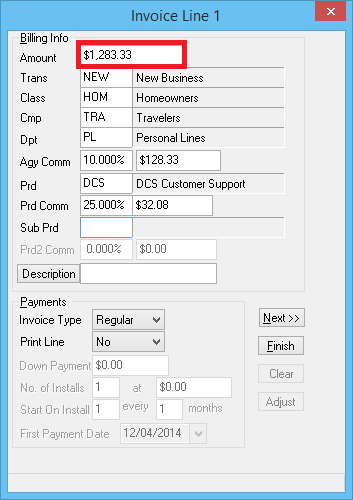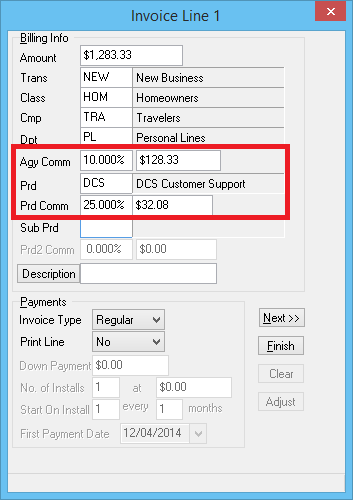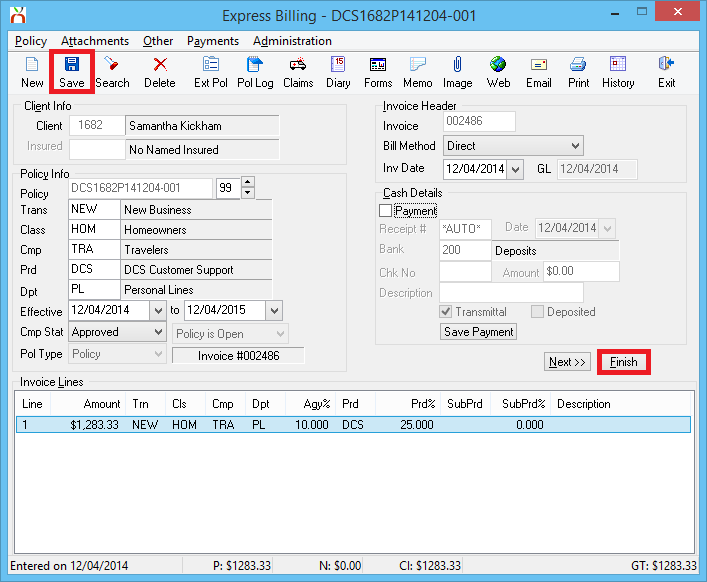Difference between revisions of "Invoice: Create An Invoice"
m |
(updated for 2015) |
||
| Line 55: | Line 55: | ||
Before you begin, the policy must be [[Policy: Create A Policy|entered in the system]]. All invoice transactions as saved to a policy, specifically to a policy sequence (policy transaction). Each time a policy change occurs, a new policy sequence is added to record the change. For example, when a policy is endorsed, an [[Policy: Endorse A Policy|endorsement transaction is added to the existing policy]]; when a policy is renewed, a [[Policy: Renew A Policy|renewal transaction is added to the existing policy]]. | Before you begin, the policy must be [[Policy: Create A Policy|entered in the system]]. All invoice transactions as saved to a policy, specifically to a policy sequence (policy transaction). Each time a policy change occurs, a new policy sequence is added to record the change. For example, when a policy is endorsed, an [[Policy: Endorse A Policy|endorsement transaction is added to the existing policy]]; when a policy is renewed, a [[Policy: Renew A Policy|renewal transaction is added to the existing policy]]. | ||
| − | #Load | + | #[[Client Tab#Find a Client|Load a client]] on one of the [[Client Tab|client tabs]]. |
| − | #Select the ''' | + | #Select the (+) next to '''Policies'''. ''(To expand the band by default, see: [[Preferences]])'' |
| − | #Select ''' | + | #'''Left-Click''' the desired policy number to open [[Policy Express]]. |
| + | #Select '''[[Express Billing]]''' in the top toolbar. | ||
#:The policy sequence cannot be invoiced if an invoice already exists for that sequence. If the policy sequence is already invoiced, [[:Category:Policy Tasks|first create a new policy sequence]]. ''(See images on right.)'' | #:The policy sequence cannot be invoiced if an invoice already exists for that sequence. If the policy sequence is already invoiced, [[:Category:Policy Tasks|first create a new policy sequence]]. ''(See images on right.)'' | ||
#Verify the '''Bill Method''' as either [[:Category:Agency Bill|Agency Bill]] or [[:Category:Direct Bill|Direct Bill]]. ''(To change the default for the policy company see the [[Company Profile]])'' | #Verify the '''Bill Method''' as either [[:Category:Agency Bill|Agency Bill]] or [[:Category:Direct Bill|Direct Bill]]. ''(To change the default for the policy company see the [[Company Profile]])'' | ||
| Line 70: | Line 71: | ||
#Optionally enter a short '''Description''' which will display for the line on the printed invoiced. | #Optionally enter a short '''Description''' which will display for the line on the printed invoiced. | ||
#Select '''Next''' to add an additional invoice line, such as a fee or tax. An invoice can have a maximum of seven lines. | #Select '''Next''' to add an additional invoice line, such as a fee or tax. An invoice can have a maximum of seven lines. | ||
| − | #:If additional lines are created, begin as step # | + | #:If additional lines are created, begin as step #8 above for each additional line. |
#Select '''Finish''' when done, then '''Save''' when prompted. | #Select '''Finish''' when done, then '''Save''' when prompted. | ||
#Select '''Finish or Save''' to finalize the invoice. This action will generate an invoice number, and create all of the [[General Ledger Profile|general ledger]] [[:Category:Receivables|receivables]] and [[:Category:Payables|payables]] for the invoice. | #Select '''Finish or Save''' to finalize the invoice. This action will generate an invoice number, and create all of the [[General Ledger Profile|general ledger]] [[:Category:Receivables|receivables]] and [[:Category:Payables|payables]] for the invoice. | ||
#:[[File:Expbill-createinv-reg-finalize.png]] | #:[[File:Expbill-createinv-reg-finalize.png]] | ||
#Select '''Print''', '''Email''', or '''Exit'''. | #Select '''Print''', '''Email''', or '''Exit'''. | ||
Revision as of 14:52, 31 December 2015
| Related Pages |
| Related Categories |
Invoices create the policy related receivable and payable amounts for clients, companies, and producers. An invoice transaction can be configured as either Agency Bill, or Direct Bill.
Any invoice can be created using the Express Billing interface, however most Direct Bill invoices are created through either Commission Builder or Commission Download during the monthly direct bill commission statement process.
- For policy invoices, requires Other -> Security System -> AR -> Policy Transaction -> View and Entry.
- For quote invoices, requires Other -> Security System -> AR -> Quoted Transaction -> View and Entry.
Other Methods or Types
- Adjustments: Invoice: Adjust An Invoice.
- Cancellation or Return Premium: Create and Process Return Premium Invoice Due to Cancellation or Endorsement.
- Convert from Submission Or Quote: Invoices attached to quotes do not affect the general ledger. Quote invoices are entered using the same interface detailed below. The quote invoice will be converted to a regular invoice when the quote is converted to a policy.
- Download: Any invoice can be created using the Express Billing interface, however most Direct Bill invoices are created through either Commission Builder or Commission Download during the monthly direct bill commission statement process.
- Installment Billing: Invoice: Create An Invoice - Installment Billing
- Invoice Wizard: Invoice: Create An Invoice - Invoice Wizard
- Mortgagee Invoice: Invoice: Override Payee On Invoice (Mortgagee Invoices)
- Premium Finance: Invoice: Create An Invoice - Premium Finance
There are two additional specialized invoice types: Agency Fees, and Late Charges.
Non-Policy Related vendor payable invoices are paid using through Vendor Payables, not the process documented below.
Regular Invoice Using Express Billing
Before you begin, the policy must be entered in the system. All invoice transactions as saved to a policy, specifically to a policy sequence (policy transaction). Each time a policy change occurs, a new policy sequence is added to record the change. For example, when a policy is endorsed, an endorsement transaction is added to the existing policy; when a policy is renewed, a renewal transaction is added to the existing policy.
- Load a client on one of the client tabs.
- Select the (+) next to Policies. (To expand the band by default, see: Preferences)
- Left-Click the desired policy number to open Policy Express.
- Select Express Billing in the top toolbar.
- The policy sequence cannot be invoiced if an invoice already exists for that sequence. If the policy sequence is already invoiced, first create a new policy sequence. (See images on right.)
- Verify the Bill Method as either Agency Bill or Direct Bill. (To change the default for the policy company see the Company Profile)
- Choose the correct Invoice Date.
- Select Next to create the first invoice line.
- Enter the Premium Amount. (For values greater than 999.99, the comma is not required)
- Verify or change any of the default values. The transaction, class, company, department and producer will all default from the policy.
- Enter the Agency Commission and Producer Commission if the defaults are not correct. (The Agency Commission will default from the Company Profile. The Producer Commission will default from the Producer Profile.)
- Optionally enter a short Description which will display for the line on the printed invoiced.
- Select Next to add an additional invoice line, such as a fee or tax. An invoice can have a maximum of seven lines.
- If additional lines are created, begin as step #8 above for each additional line.
- Select Finish when done, then Save when prompted.
- Select Finish or Save to finalize the invoice. This action will generate an invoice number, and create all of the general ledger receivables and payables for the invoice.
- Select Print, Email, or Exit.
